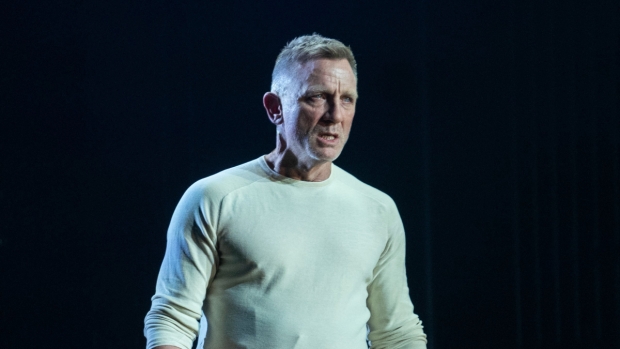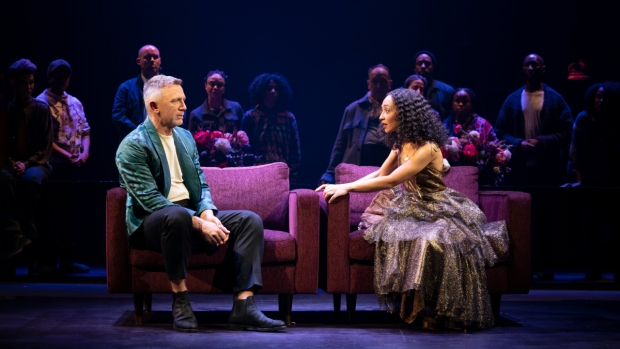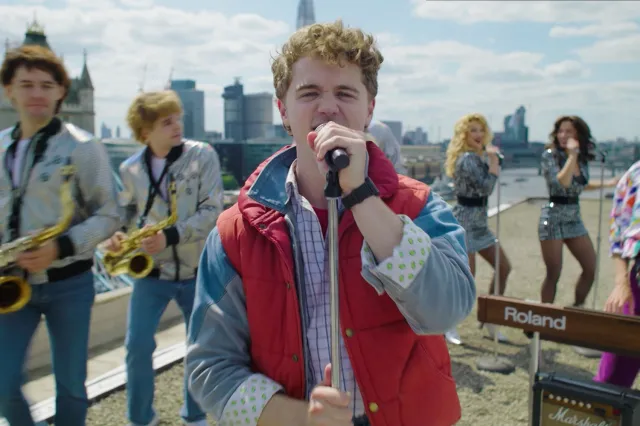Macbeth review – Daniel Craig and Ruth Negga lead an uneven revival on Broadway
Sam Gold directs the new revival of Shakespeare’s tragedy

(© Joan Marcus)
If you've been married with any degree of success, you'll recognize the dynamic: One spouse pushes the other to take a big risk they otherwise might not — ask for a raise or, barring that, murder the boss. She'll be right behind you to hide the evidence, she swears. And like a bank deposit, that support is returned with interest when she loses her nerve.
In that respect, Daniel Craig and Ruth Negga perfectly capture the seesaw relationship between Lord and Lady Macbeth, one of the more functional marriages in the Shakespeare canon. They feed off each other, Lady covering for Mac, both perfectly at home in their culture of two. It's about the only thing Sam Gold's production at the Longacre Theatre gets right.
Gold (Tony winner for Fun Home) has been the director of some of the most high-profile recent Shakespeare productions in New York: On Broadway there was King Lear, starring a Glenda Jackson who seemed to be in her own self-directed production within Gold's high-concept slog. But there was also his conference room Hamlet, starring Oscar Isaac, and Othello-in-a-plywood-box, which featured Craig in the role of Iago. He must have had so much fun, he came back for seconds.
Like those earlier ventures, Gold's Macbeth is both austere and overdesigned, teeming with half-executed conceits and uneven performances. Actors are left to sink or swim, with those who bring their own strong perspective to the stage faring better than those who don't. The director cannot be bothered to make them inhabit the same world.
It starts out fine enough, with the affable Michael Patrick Thornton delivering a dramaturgical standup routine about this play's genesis during a pandemic. This leads into a smartly trimmed exposition that jumps between King Duncan (Paul Lazar) receiving news of the battle and the witches (Bobbi MacKenzie, Maria Dizzia, and Phillip James Brannon with a haunting grin) preparing a brew for Macbeth, Duncan's loyal vassal. They predict that he will become Thane of Cawdor and then King, and that his companion, Banquo (Amber Gray), will beget Kings. Soon after, Lord and Lady Macbeth begin plotting ways to speed the former prophecy along, while heading off the latter.

© Joan Marcus
Gold maintains a naked theatricality throughout, with actors watching the proceedings from the exposed wings. Performers create the "fog and filthy air" with handheld fog machines, which are employed like new toys on Christmas morning. Suttirat Larlarb mostly costumes the actors to appear as they might during rehearsal. Craig is the major exception, donning a succession of lavish garments: a smoking jacket, a paisley housecoat, and then a full-length fur (the trappings of sudden wealth).
Mikaal Sulaiman seems to have designed sound for a haunted house aimed specifically at people with a fear of awkward timing. Try not to howl when you hear the slasher film strings that accompany the approach of Birnam wood (ugly green projections by Jeanette Oi-Suk Yew). Lighting designer Jane Cox has installed multiple strips of overhead LED lights, which often appear to be transmitting morse code (S-O-S). Christine Jones has designed a false upstage wall to make it seem as though we're in an unadorned theater.
Of course, it's nothing of the sort. We know this because the upstage wall charges downstage for the climactic scenes, pressing the actors against the edge of the stage like Mortal Kombat fighters. Too bad it isn't as elegant as it is in the arcade. Violence director David S Leong has aimed for brutal realism, but the final confrontation between Macbeth and Macduff (Grantham Coleman) just looks like two drunks outside a Second Avenue bar at 3am.
This is despite a fine effort put in by both Craig and Coleman, who one can easily imagine in a better production. Not so with Gray, whose Banquo is instantly forgettable. Lazar executes a nifty transition from Duncan to the Porter for a bit of cringey front-of-curtain comedy. And a wooden Asia Kate Dillon plays Malcolm (the rightful heir to the throne, according to daddy) as a purple-haired scion of privilege with no discernible charisma, charm, or talent — a fair portrayal of the incoming ruling class of this country.
While Negga and Craig are electric together (I kept wondering what it might look like if they swapped roles every other performance, like Laura Linney and Cynthia Nixon), their performances fall apart when they're on their own. Negga's standard-issue mad scene seems to have never progressed beyond early rehearsals, and Craig's Act 5, scene 5 speech feels like a eulogy delivered at the funeral of a neighbour he barely knew, but waved at from the driveway each morning. Tomorrow and tomorrow and tomorrow…
This Macbeth hovers in a fog of confusion from beginning to end, which features the actors chowing down on soup as they stare out at the hungry and irritated crowd. I'm still not sure what it means, and I suspect I'm not meant to. Perhaps some people will walk away thinking they're just not clever enough to get it – an old ruse in the theatre, but perhaps too ambitious a vault here.












